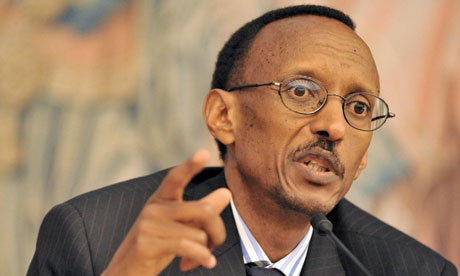Britain has frozen £16m of aid to Rwanda pending an investigation into its alleged role in fuelling a deadly regional conflict, the most significant blow yet to a country that has long been a darling of western donors.
The decision follows similar steps by the US and Netherlands to censure president Paul Kagame after a UN report accused Rwanda of arming rebels responsible for atrocities in neighbouring Democratic Republic of the Congo.
The UK, the biggest bilateral donor to Rwanda, has previously been seen as less willing to criticise Kagame, championed by Tony Blair as a "visionary leader" despite concerns over internal repression. The UN's findings appear to have persuaded London to halt its latest payment – the first reprimand of its kind since efforts to rebuild the tiny east African nation began following the 1994 genocide.
The Department for International Development (Dfid) said it had decided that the disbursement of £16m of UK aid, due this month, should be delayed. This was the first of two general budget support payments due in the financial year 2012-2013. The last such payment was made in December 2011.
A Dfid source said all Britain's aid recipients must adhere to four strict "partnership principles", including human rights and other international obligations, good governance, transparency, fighting corruption and domestic accountability.
"The Rwanda general budget support payment has been delayed while we consider whether these expectations are still being met," the source added, without giving details of the timespan involved.
In the financial year 2012-2013, UK general budget support for Rwanda is £37m, Dfid added. Total budget support to Rwanda is £50.5m, while total UK aid to the country is £75m.
The UN group of experts report accused Rwandan officials of violating a UN arms embargo by supplying weapons, ammunition and fighters to a group called M23, responsible for the worst outbreak of fighting in eastern Congo for several years. Clashes between the Congolese army and M23 have forced thousands to flee their homes this week, adding to some 260,000 people already displaced since April.
The Dutch government would discuss future aid to Rwanda with other EU governments and resumption would require an immediate end to Rwandan backing for rebels in Congo, she added.
Last weekend the United States announced a $200,000 (£127,198) cut in military aid to show it was "deeply concerned about the evidence" . This is also seen as a significant shift in policy given that Washington has stood by Rwanda despite its long history of involvement in wars in Congo since the genocide.
The widening international stand was applauded by Human Rights Watch. Carina Tertsakian, its senior researcher on Rwanda, said: "We welcome the fact that first the US then the Netherlands have sent a clear message to the Rwandan government that they are no longer prepared to provide unconditional support while Rwanda stokes violent conflict in neighbouring Congo.
"We hope this signals a broader shift in international policy and that Rwanda's friends and allies will begin insisting on respect for human rights, inside Rwanda as well as in Congo."
She added: "The recent report that Dfid is delaying disbursement of some of its budget support could also be very significant in light of the fact that the UK is the largest bilateral donor to Rwanda and has been reluctant to take a strong public stand on Rwanda's human rights record."
Rwanda, which depends on foreign aid for more than a third of its budget, has repeatedly denied the UN's findings. Its foreign minister, Louise Mushikiwabo, expressed regret at "hasty decisions based on flimsy evidence" made by donor partners.
"We have just concluded discussions with the [UN] group of experts and comprehensively rebutted every one of the allegations, with conclusive documentary evidence," he said.
"Once we share this with development partners, we believe this will provide them the reassurance they seek in light of an orchestrated media and political campaign to blame Rwanda for this crisis."
Speaking to the Guardian this week,, the head of the US war crimes office warned Kagame and other Rwandan leaders that they could face prosecution at the international criminal court (ICC) for "aiding and abetting" crimes against humanity in a neighbouring country.
But Mushikiwabo shrugged off the report. "Let's just take the wildest guess and say that the US government actually does believe that," she told Reuters. "They wouldn't announce it through a journalist. That's not how the US government functions.
"Not only is there no truth to that, but it also shows how people are just going wild with this whole Congo thing."
The M23 rebellion takes its name from a 2009 peace accord the rebels say was violated by the Congolese government. It has been swelled by hundreds of defectors from the Congolese army who walked into the bush in support of fugitive Congolese general Bosco Ntaganda, dubbed "The Terminator" and wanted by the ICC on war crimes charges.


0 Comments:
Post a Comment
Subscribe to Post Comments [Atom]
<< Home